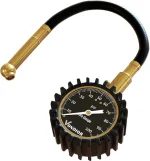Best pressure gaugesThe low pressure light came on in my car this morning so I grabbed the tire gauge in the glovebox and checked one. Imagine my surprise when it rocketed up to almost 50 psi. The tire was no more than 35 psi even before the light came on, so that gauge is worthless. That’s the worst example, but every tire gauge I have reads different. I finally decided to standardize on a US made one I bought from Amazon, but I still have no idea if it’s accurate.
How does someone find out what the true pressure reading is on a tire, or to calibrate a gauge?
I have this JACO Elite one after other replies to another pressure gauge thread. I like it as it goes to 100psi for the higher trailer tires and spares. I might get more for the other cars. It's on sale currently and I like that it does to the .1psi not just .5 for the Slimes.
My other 5 cars I maintain have pencil gauges that are pretty close as spares. They all have a Slime one like this that is used regularly and close to the JACO when checked. At least pretty consistent that I know of. There is a newer version that supposedly seals better to valve stem.
I can set the tires on the cars on a cold day, no sun, after sitting for 12 hours overnight and some of my TPMS sensors on the Pilot, Tucson, Renegade read different then the JACO and the other vehicles by 1-2 psi.
The Slimes have gotten me through YEARS of flat even tread wear. If I see or measure odd between center and edge of tires, I'll adjust my cold inflation pressure accordingly. The JACO has batteries that can be replaced easily and I think will serve the same dedicated accurate enough for my daily drives well for a long time.

